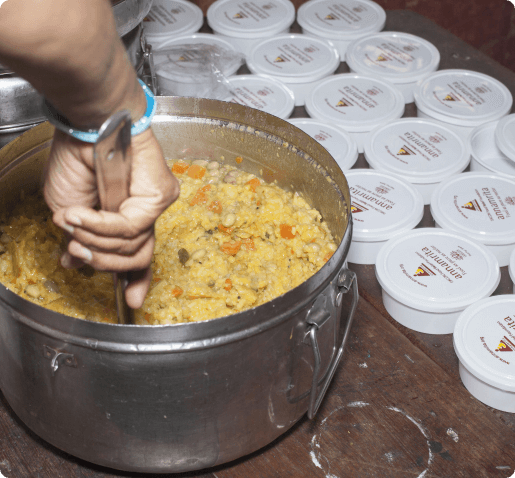

At Annamrita, we believe that the recipe for nourishment begins with food; whether it’s our ingredients or our kitchen, we never compromise on our hygiene standards.
Our process entails 3 crucial factors – Cost, Quality, and Delivery – on which the entire process is based. Raw materials and ingredients that go into every meal are inspected and sorted for quantity and quality standards as per FIFO – First In and First Out method in turn maintaining the high cleanliness and hygiene standards.
Each wholesome meal made at Annamrita Foundation goes through a set of rigorous processes and procedures carefully controlled under an FSMS – Food Safety Management System.
The salient features of this system are:

Understanding the periodic requirement of each kitchen is the very first step of our process. Before we reach out to the vendors, our teams prepare a weekly consumption requirement list that includes all items like food grains, lentils, spices. A special two-day list is prepared for vegetables.

It is essential for us to ensure that the meals we serve are made out of nutritious and fresh ingredients. While we procure provisions like rice and lentils from FSSAI license holders, vegetables are procured every two days or are organically grown in-house.
To maintain quality standards, we’ve put in place processes that include sortex cleaning, packing in clean bags, labeling, and vehicular sanitation. Raw materials and ingredients that go into every meal are inspected and sorted for quantity and quality standards as per FIFO – First In and First Out method.


All our food for mid-day meals and food relief programmes is cooked in batches via steaming to ensure maximum retention of taste, color, and nutrients. We maintain a cooking temperature of above 90°C to eliminate any potential microorganisms and establish optimal shelf life. We also make sure to use only fresh ingredients and deploy a daily kitchen sanitization procedure that records consistently high hygiene standards.
Once each meal is ready, it’s checked and documented for color, temperature, appearance, flavor, and consistency before packaging. Containers are air-dried after washing and sanitizing, and then filled with food and sealed with a color-coded security seal – schools are instructed not to accept containers if the seal is broken.

Ingredient Storage Process
Rice is the most important ingredient in all our meals. And it is imperative for us to ensure that the raw rice we receive is free from any foreign and unhealthy element.
We follow a five-step process to clean and store the rice before it is ready to be used.
Fumigation process
First, the rice is bagged, heat sealed with PVC sheets and fumigated as the initial step of cleaning.
Pre-cleaning with aspirator
Rice grains are further cleaned with the help of a Separator and Classifier MTRA machine, where coarse and fine impurities are removed.
De-stoning process
This process removes the foreign materials the same size as rice grains via a gravity separator machine.
Silky polisher
Any dust or impurities sticking to the body of the rice particle are removed by polishing. However, in this polishing process the rice kernel’s tip remains intact thereby preserving the nutritional value.
Sortex cleaning – rice sorting
Here, rice particles pass through 190 channels fitted with 6 cameras in a sortex machine where each grain is scanned through powerful, hi-res camera to check parameters such as size (the length and width of each grain) and colour (discoloured grains are removed).
